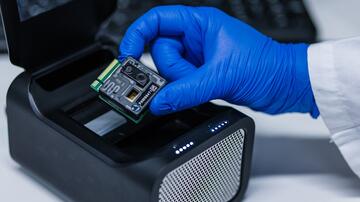Exposure to antibiotics during birth by caesarean section may increase infants’ long-term health risks
Animal studies indicate that prenatal contact with antibiotics can affect the early development of intestinal flora and lead to serious long-term health problems in offspring. In a pilot study, scientists around Prof Jan Rupp of the German Center for Infection Research (DZIF) compared the effect of antimicrobial infection prophylaxis during caesarean deliveries—administered to the mothers either before the start of surgery or after clamping the umbilical cord—on the development of their infants’ intestinal flora. The study detected persistent differences in intestinal flora composition of infants exposed to antibiotics before clamping of the umbilical cord. These findings indicate that early contact with antibiotics can have a lasting impact on essential metabolic functions and thus on the health of infants.
Worldwide, the number of births by caesarean section is increasing; in Germany alone, 31 percent of all infants were delivered by caesarean section in 2019. To prevent complications with infections in mothers, antimicrobial prophylaxis during surgery is standard practice in maternity hospitals. International guidelines recommend administration of antimicrobial prophylaxis 30 to 120 minutes before surgery, which results in exposure of newborns to antibiotics while still in the womb.
Animal studies have shown that exposure to antibiotics before or during birth has a marked effect on the composition of the gut microbiome—the totality of microorganisms in the gut—with potential long-term consequences in the offspring. These consequences include increased risks of childhood asthma, allergies and obesity.
Now, a research team from Lübeck, Kiel and Würzburg investigated the extent to which the timing of antibiotic administration during caesarean delivery—before opening of the abdominal wall versus after clamping of the umbilical cord—influences microbial colonisation of the newborns' intestines and the development of antimicrobial resistance. To this end, the scientists compared the composition of the microbial flora in stool samples (meconium as well as samples taken at one month and one year of age) of infants whose mothers had received antibiotics either immediately before caesarean section or after clamping of the umbilical cord. Using gene sequencing, the researchers determined the microbial composition of the different stool samples and developed predictive models for the resulting metabolic differences in the intestinal flora.
"Our study shows that the timing of prophylactic antibiotic administration can significantly influence the development of intestinal flora—especially the predominance of certain bacterial genera and metabolic pathways—in children in the first year of life," explains study co-lead Prof. Christoph Härtel.
Furthermore, the researchers discovered that genes for antibiotic resistance were acquired already in the first days of life. However, the study—conducted as a pilot study with a small number of in total 40 subjects—did not find a clear correlation of the presence of resistance genes with prenatal contact with antibiotics.
"The presence of resistance genes already in the first days of life is a warning signal. It indicates that early contact with antibiotics should be avoided as far as possible in order to not jeopardise antimicrobial therapies required at a later time by already existing resistance," emphasises the study’s co-lead Prof Jan Rupp, scientist at the DZIF and Director of the Department of Infectious Diseases and Microbiology at the University Hospital Schleswig-Holstein/University of Lübeck.




